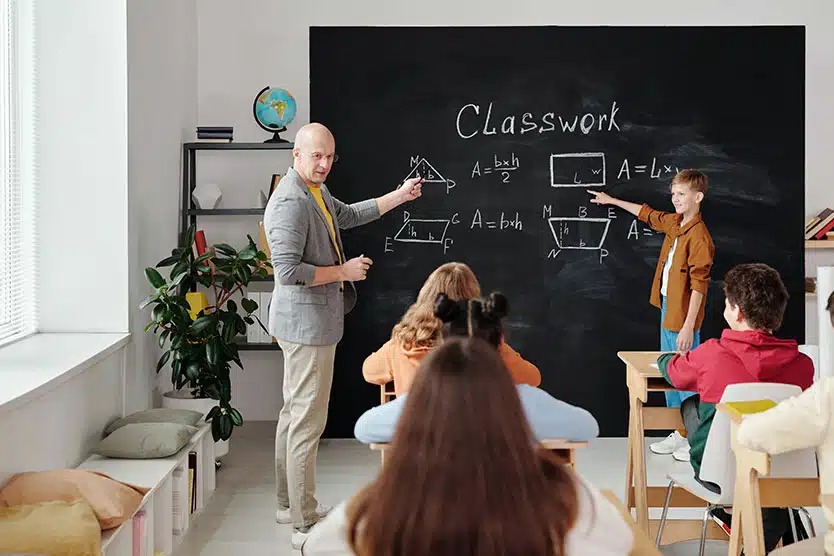
What does it mean when someone says an activity is “like math”? People often say this of activities like chess, as if the calculations you make moving pieces are akin to crunching numbers.
Plotting moves on a chessboard doesn’t actually involve numbers, so how can it be mathematical? Learning to code is mathematical too, and also doesn’t directly require multiplying or dividing large sums.
Let’s check out how RP4K’s coding classes are grounded in mathematical concepts.
RP4K’s co-founder Elliott Bay is a mathematician with a B.Sc. and M.Sc. in Mathematics. Elliott developed RP4K’s computer game programming curriculum after teaching linear algebra and calculus at the University of Manitoba and working for years as a math tutor.
In 2020, Elliott returned to his mathematician roots to create a new coding course, “Mathematics and Physics for Video Game Programmers.” RP4K has mathematical roots; lately, they’re in bloom again.
The programming class at RP4K revolves around teaching kids how to design and code their own video game, one they can play with friends and family and show off all they’ve learned. The idea is to prioritize fun above all so kids enjoy the sessions and feel driven to learn.
There’s also another sly idea at work. In just the way children’s medication has fun flavours to mask its natural taste and make consuming medication that much easier, our coding classes use video games, so kids don’t even notice they’re learning concepts like integers, vectors, and even trigonometry.
Even from the very first RP4K course teaching our youngest students about basic computer skills, children learn math like fractions, decimals, and the very beginning of algebra. Our most advanced students learn programming fundamentals like inheritance, chasing algorithms and camera manipulation. They also learn more advanced trigonometry, pitch/yaw/roll, matrices, and the beginning of 3D programming.
As mentioned, RP4K’s newest course, Mathematics and Physics for Video Game Programmers, isn’t technically a coding course at all. Elliott teaches this course personally to experienced and elite students, usually 14-18 years of age, who are already very good in mathematics.

The course focuses on math, physics, proofs, and examples. After observing that the math or physics formula shows up in our coding courses, Elliott decided to isolate it and make it the centre of its own class.
Again, this is an advanced class that isn’t for everybody! But it will definitely help your children understand math in several ways:
If your child takes this course, they can easily transfer coding skills to the classroom and beyond. They’ll be more than ready for university-level math courses or becoming a professional coder.
Unlike many online coding classes that launched in response to the COVID-19 pandemic, RP4K has operated for over two decades. In that time, we’ve seriously revised and revamped our curriculum and fine-tuned the program.
Our latest course, Mathematics and Physics for Video Game Programmers, might be new, but the reviews are already in! RP4K parent Liza Swale gave a 5-star Google Review and described what our new math course has meant for her son:
“My son has been attending Real Programming 4 Kids for 5 years and we couldn’t recommend it more highly! As a homeschooling family we have found Real Programming to be a wonderful companion to our journey. My son showed interest and aptitude in math and programming at a young age and Real Programming has challenged and supported him from age 11. At 16 he’s now exploring University concepts in Math! Amazing!”
Any mathematician who has ever faced problem-solving challenges understands that math isn’t always about numbers. You need to understand the numbers underlying certain concepts but also how different concepts fit together.
Parents enroll their children in courses that promote STEM skills because of the direct and indirect benefits. The direct benefits are explicit mathematical skills kids will absorb and take to university or their eventual job.
Indirect benefits include understanding how to think laterally and creatively to find a solution that works. Kids also improve problem solving abilities when they learn that experimenting with potential solutions en route to the right one is a necessary part of the learning process.
This is a crucial lesson because it improves how they learn and also promotes better self-esteem. Kids come to view wrong answers as a necessary part and a prelude to finding the right answer rather than an error to beat themselves up over.
Coding teaches important lessons because the underlying mathematical concepts require precise answers, but there’s also lots of room for creative thinking. When kids learn explicit math skills that promote and encourage open-ended lateral thinking in a positive and enjoyable atmosphere, they’ll have a productive and fun start to their math and coding journey.
It’s impossible for a parent to know in advance what profession their child will enter one day. Parents love sending their children to coding class because it teaches them many different things that may be useful down the road, from math concepts, self-esteem and, naturally, coding.
Your child may not grow up to become a math professor or a professional video game coder. However, the math and computer skills they learn at RP4K will serve them well in life and in whatever profession they choose. We live in a digital world, and technology’s role in daily life seems only set to grow.
Enrolling your child in coding classes makes math come alive in fun and supportive ways. Creating video games in small groups of a maximum of three other students is a recipe for success. For more about how coding can help improve math skills, enroll in a class, try a free trial, or contact us with any questions.